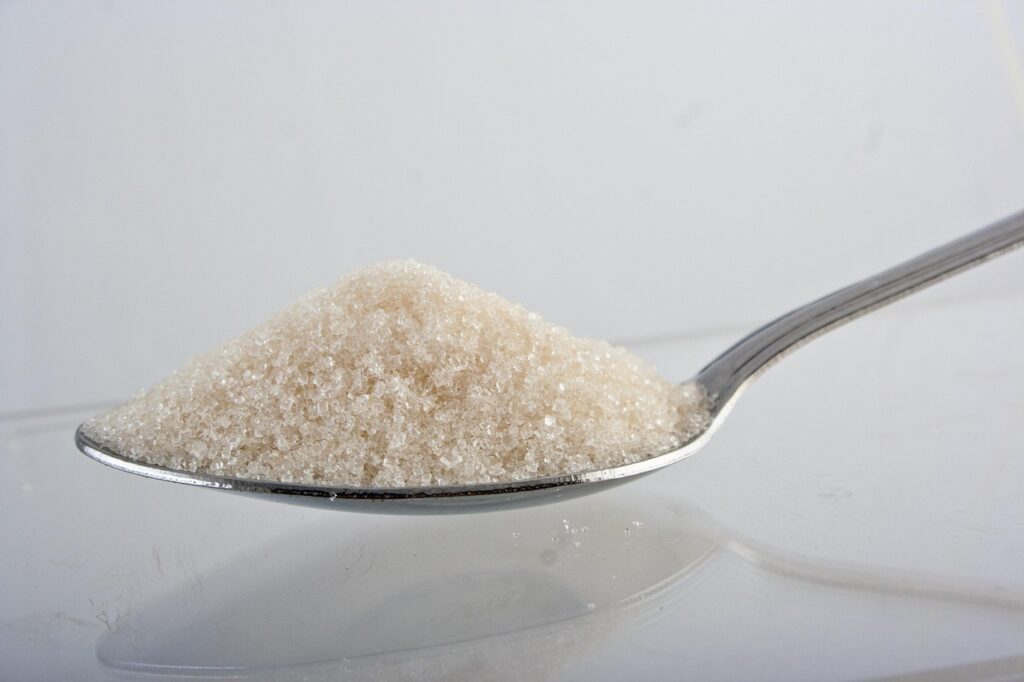Dangers of Glucose: How Refined Carbohydrates Damage Your Body and Cause Diabetes

Most people think glucose gives energy—but the real dangers of glucose lie in how it silently weakens your organs, fuels diabetes, and strips your body of vital minerals. This sweetener hides in nearly every processed food on grocery store shelves, masquerading as a harmless ingredient while creating a cascade of health problems that conventional medicine struggles to address.
Understanding refined carbohydrate dangers requires looking beyond simple calorie counts to examine how denatured foods interact with your body’s delicate mineral balance. When you consume glucose-laden products, you’re not just eating empty calories—you’re actively depleting essential nutrients that your organs need to function. The connection between glucose and diabetes represents just one piece of a much larger puzzle involving mineral deficiency, pancreatic stress, and metabolic breakdown.
This comprehensive guide reveals the true science behind glucose toxicity and empowers you with practical strategies to protect your health naturally. You’ll discover which everyday foods contain hidden glucose, how refined sugars damage vital organs, and why choosing whole, mineral-rich alternatives transforms your wellbeing from the inside out.
The Hidden Dangers of Glucose in Everyday Foods
Glucose serves as the ultimate symbol of denatured carbohydrate foods flooding our modern diets. Food manufacturers embrace glucose as a food filler because it costs less than quality ingredients while extending shelf life and enhancing sweetness. This economic calculation prioritizes profit over nutrition, leaving consumers to bear the health consequences.
With a predicted value of around $53.7 billion in 2024 and a compound annual growth rate (CAGR) of roughly 5.0%, the commercial glucose market is expected to reach a valuation of approximately 91.85 billion by 2035. These businesses incorporate glucose into products that appear on every supermarket aisle, creating widespread exposure to this problematic ingredient.
The denatured carbohydrates dangers become immediately apparent when examining what glucose lacks. During processing, manufacturers strip away the mineral salts naturally present in whole corn, concentrating only the sugar component. These discarded minerals—rich in organic and inorganic salts and colloids—get sold as cattle feed or fertilizer because they’re too valuable for animal nutrition to waste, yet somehow acceptable to remove from human food.
Common foods hiding glucose include:
- Commercial baked goods (pies, cakes, pastries)
- Mass-produced candies and confections
- Jarred jams and jellies
- Breakfast cereals and granola bars
- Flavored yogurts and “health” drinks
- Salad dressings and condiments
- Protein bars and “energy” snacks

When you purchase these processed products, you consume refined carbohydrates devoid of the mineral salts your body requires for proper metabolism. The glucose enters your system without the nutritional cofactors that help your organs process it safely, creating the perfect conditions for metabolic dysfunction.
How Glucose and Diabetes Are Closely Linked
The relationship between glucose and diabetes reveals one of modern medicine’s most significant yet overlooked connections. Medical authorities recognize that diabetic tissues exist in a state of sugar starvation despite being bathed in glucose-rich blood. This paradox highlights a critical question: what causes diabetes to develop in the first place?
In healthy individuals, blood maintains a precise glucose concentration of 0.1%—one part glucose per thousand parts blood. The pancreas actively guards this upper limit, creating what researchers describe as an impenetrable barrier. However, when blood glucose exceeds this threshold, a condition called hyperglycemia develops. Prolonged hyperglycemia eventually damages the kidneys’ ability to eliminate excess glucose, causing sugar levels to rise progressively higher.
The dangers of glucose become especially clear when examining tolerance levels. Clinical evidence demonstrates that habitual consumption of refined carbohydrates systematically diminishes the body’s glucose tolerance. Medical observations confirm that overindulging in sugars and starches reduces tolerance capacity, causing mild diabetic cases to progress toward severe disease states—even under medical treatment.
Younger patients show the most dramatic evidence of carbohydrate excess damage. Medical authorities note that physicians often advise young diabetics to consume no more than two-thirds their tested tolerance level precisely because excessive carbohydrate intake accelerates disease progression. The pattern proves consistent: glucose and diabetes connect through a mechanism of accumulated stress that eventually overwhelms pancreatic function.
Research on glucose tolerance reveals striking differences between natural and refined sugars. Studies show diabetic patients often tolerate natural fruit sugars and milk sugars better than processed glucose. Even more remarkably, diabetics handle 100 grams of starch from oatmeal (complete with natural mineral salts) while 50 grams of processed glucose passes almost entirely into urine. This dramatic difference—despite the lack of complete scientific explanation—underscores that glucose toxicity operates through mechanisms distinct from natural sugar metabolism.
Refined Carbohydrate Dangers and Why Processed Foods Harm the Body
Refined carbohydrate dangers extend far beyond simple blood sugar elevation to encompass systematic mineral depletion that compromises multiple body systems. Modern processing techniques strip away the very components that make carbohydrates safe for human consumption, leaving behind concentrated sugars that actively rob the body of stored nutrients.
The mineral loss from refined food creates a nutritional crisis hiding in plain sight. Your body tenaciously guards its alkaline mineral reserves—calcium, magnesium, potassium—because these bases neutralize organic acids produced daily through normal metabolism. When you consume mineral-deficient foods like glucose, your body must draw from these precious reserves to maintain pH balance and process the incoming sugar load.
Scientific investigations confirm that demineralized foods cause more harm than consuming nothing at all. Animals fed exclusively on refined, mineral-free foods die faster than animals receiving no food whatsoever. This shocking finding demonstrates that refined sugar health problems stem not merely from what these foods contain, but from what they force the body to sacrifice.
Consider these documented refined sugar health problems:
- Chronic constipation progressing to severe digestive disorders
- Anemia from iron and mineral depletion
- Lowered immunity making infections more severe
- Tuberculosis progression accelerated by carbohydrate excess
- Acidosis from insufficient alkaline reserves
- Water retention creating false appearance of health
- Dental decay from mineral deficiency
Modern diets demonstrate dangerous one-sidedness, with excessive refined carbohydrates crowding out mineral-rich vegetables and whole grains. Medical researchers observe that children who appear plump and well-nourished on sugar-heavy diets often prove “water-logged” with minimal infection resistance. This false health dissolves rapidly when illness strikes because strengthening the heart naturally requires proper mineral nutrition that refined foods cannot provide.
The contrast between natural and processed foods reveals critical metabolic differences. Honey operates differently than glucose in your body. Maple syrup, sorghum, and traditional molasses contain mineral salts completely absent from commercial glucose. These traditional sweeteners nourish while modern glucose merely provides empty calories that tax your organs.
Glucose Toxicity — When the Body Can No Longer Cope
Glucose toxicity describes the state where accumulated sugar overwhelm your body’s processing capacity, triggering a cascade of metabolic failures. This condition doesn’t develop overnight—it builds gradually as excessive refined sugars systematically weaken the organs responsible for maintaining glucose balance.
Understanding glucose toxicity requires examining how surplus sugar behaves in your bloodstream. Healthy circulation naturally eliminates glucose above the 0.1% threshold, but this protective mechanism depends on properly functioning organs—particularly the pancreas, liver, and kidneys working in concert. When these organs face relentless glucose exposure from processed foods, their capacity gradually diminishes.
How Excess Refined Sugars Damage the Pancreas and Liver
The pancreas plays a central role in glucose regulation by secreting substances that help control blood sugar levels. Medical research reveals this organ selectively concentrates lime and potash salts—alkaline minerals essential for creating its protective secretions. However, glucose demonstrates a chemical affinity for these exact minerals, combining with calcium and potassium to form compounds called glycosates or saccharates.
This chemical stealing mechanism creates a vicious cycle. Excess refined sugars consume the minerals your pancreas needs to function properly, simultaneously flooding your bloodstream with glucose levels that the weakened organ can no longer control. The liver, which actively produces glucose from stored carbohydrates, adds to the burden when processing power declines.
Key metabolic effects of glucose toxicity include:
- Progressive weakening of pancreatic insulin function
- Liver overproduction of glucose from impaired regulation
- Kidney damage from attempting to filter excessive sugar
- Reduced oxygen absorption affecting all tissues
- Accumulation of acidic byproducts from incomplete metabolism
- Thyroid and adrenal stress from compensatory mechanisms
Research into pancreatic function demonstrates that excess glucose doesn’t merely challenge this organ—it actively destroys its capacity to maintain the barrier against hyperglycemia. Recent studies on glucose metabolism confirm that the dangers of glucose stem from both quantity and quality, with refined sources proving particularly damaging compared to whole-food carbohydrates.
The oxygen-stealing properties of glucose deserve special attention. Scientific observations note that diabetic patients absorb less oxygen than healthy individuals. Since glucose demonstrates a strong tendency to combine with oxygen in alkaline solutions, excessive glucose consumption may function as an “oxygen pirate,” stealing this vital element from tissues that desperately need it for normal function.
Mineral Loss from Refined Foods
Every bite of glucose-sweetened food initiates an invisible mineral transaction that leaves you nutritionally depleted. The body maintains strict mineral balance requirements, with daily losses through normal excretion requiring constant replacement through diet. Refined foods contribute almost to nothing in this essential intake while simultaneously increasing mineral expenditure needed to process their deficient calories.
The mineral loss from refined food manifests first in subtle ways—slight fatigue, poor wound healing, increased cavity formation. Over time, as reserves deplete, more serious conditions emerge. Anemia develops when iron stores run low. Bone density decreases when calcium gets mobilized for pH balance. Nerve function deteriorates when potassium supplies decrease.
Compare natural honey to commercial glucose syrup. Honey contains trace minerals, enzymes, and bioactive compounds that support metabolism. The bees concentrate these beneficial elements from flower nectar, creating a sweetener that nourishes while it satisfies. Glucose syrup, by contrast, represents pure carbohydrate stripped of every vitamin, mineral, and cofactor that made the original corn nutritious.
This mineral deficiency from sugar creates cascading health problems. Pregnant women face particular danger because developing babies act as “mineral parasites,” drawing from maternal stores. When mothers consume refined carbohydrates during pregnancy, both they and their nursing infants suffer from inadequate mineral nutrition. Medical researchers directly connect this deficiency to high infant mortality rates and rapid tuberculosis progression following childbirth.
The mineral loss from refined food also explains why natural immunity depends on proper nutrition. Medical authorities observe that one-sided nutrition heavy in sugars, syrups, and candies destroys natural immunity in children. This immune destruction makes minor infections dangerous and allows serious diseases to progress rapidly. The contrast with children raised on mineral-rich whole foods proves stark and undeniable.
Traditional diets incorporated mineral-dense foods at every meal—leafy greens, whole grains with bran intact, mineral-rich bone broths. Modern refined food culture has systematically replaced these nourishing traditions with convenient processed items that actively deplete health. Understanding how to prevent tooth decay through diet demonstrates the direct connection between mineral intake and disease resistance throughout your body.
Glucose as a Food Filler — The Modern Diet Trap
Food manufacturers embrace glucose as a food filler because it solves multiple production challenges while maximizing profits. This sweetener extends shelf life, improves texture, enhances sweetness, and costs significantly less than quality ingredients like butter, cream, or fruit. For companies prioritizing financial returns over nutritional value, glucose represents the perfect solution.
The industrial-scale glucose production process reveals much about why this ingredient proves so problematic. Manufacturers soak corn in water to separate starch, then hydrolyze that starch into simple sugars. The mineral-rich “steep water” byproduct gets diverted to animal feed because livestock cannot thrive without these essential nutrients. Yet humans receive only the demineralized end product—pure glucose devoid of biological value.
The dangers of glucose increase when considering that approximately 80% of commercial glucose flows into prepared foods. Walk through any supermarket and you’ll find glucose hiding under various names in nearly every processed item. This ubiquitous presence means most people unknowingly consume far more glucose than they realize, creating cumulative exposure that overwhelms metabolic capacity.
How to Identify Hidden Glucose on Food Labels
Food manufacturers employ various terms to disguise glucose on ingredient lists. Learning to recognize these names empowers you to make informed choices:
- Corn syrup (all varieties)
- High fructose corn syrup
- Glucose syrup or glucose-fructose
- Maltose or maltodextrin
- Dextrose
- Modified food starch
- Corn sweetener

Remember that ingredients appear in descending order by weight. When you see multiple forms of glucose scattered throughout a label, manufacturers likely added substantial amounts while avoiding placing “sugar” at the top of the list.
Choose natural alternatives that nourish, not deplete. Traditional sweeteners like raw honey, pure maple syrup, blackstrap molasses, and date syrup provide minerals alongside sweetness. Whole fruits satisfy sugar cravings while delivering fiber, vitamins, and protective compounds that support rather than undermine health. Embracing natural uncooked foods in your diet helps restore the mineral balance refined foods destroy.
What Causes Diabetes? The Role of Refined Sugars and Denatured Carbohydrates
Medical science has long recognized diabetes as a disease of carbohydrate intolerance, yet many practitioners treat it as mysterious in origin. Examining what causes diabetes through the lens of refined food consumption reveals a clear, logical progression from dietary excess to metabolic breakdown.
The glucose and diabetes connection operates through accumulated stress that eventually destroys pancreatic function. Young, healthy organs possess remarkable capacity to handle occasional sugar excess. However, daily bombardment with refined carbohydrates systematically weakens this resilience. Medical observations document that temporary glycosuria—sugar in urine from carbohydrate overload—can become permanent diabetes when excess continues unabated.
Consider the metabolic logic: Your body in health naturally produces all the glucose it needs from whole plant foods. Complex carbohydrates in vegetables, legumes, and intact grains release sugars gradually while providing the minerals required for proper metabolism. When you add concentrated glucose on top of this natural production, you force organs to process quantities far exceeding physiological requirements.
The refined carbohydrate dangers intensify through glucose’s mineral-stealing properties. Your pancreas requires alkaline salts to manufacture its regulatory secretions. Glucose chemically binds these exact minerals, carrying them away before the pancreas can utilize them. Simultaneously, the liver overproduces glucose attempting to maintain energy supplies, adding to blood sugar levels the compromised pancreas can no longer control effectively.
Scientific evidence on hyperglycemia and diabetes confirms that glucose tolerance differs dramatically between individuals. People born with lower assimilation limits prove more vulnerable to sugar excess, becoming “potential diabetics” through refined carbohydrate consumption that healthier individuals might temporarily tolerate.
The progression follows a predictable pattern:
- Excessive refined sugar intake creates temporary blood sugar spikes
- Pancreas works overtime to maintain glucose control
- Continuous stress depletes pancreatic mineral reserves
- Organ function gradually weakens from nutrient deficiency
- Temporary glycosuria episodes become more frequent
- Eventually, permanent diabetes develops as barriers fail
Medical authorities confirm this sequence, noting that self-indulgence on sugars and starches frequently transforms mild diabetic cases into severe disease. If excess worsens existing diabetes, logic demands recognizing this same excess as diabetes’ fundamental cause—not merely a symptom requiring management.
The evidence becomes overwhelming when comparing diabetic tolerance for different carbohydrate sources. Patients handle natural oatmeal—complete with mineral-rich bran—far better than processed glucose, even when the oatmeal contains twice the total carbohydrate content. This dramatic difference cannot be explained by sugar content alone; it demonstrates that what causes diabetes involves not just quantity but the unnatural, mineral-stripped quality of refined sources.
Can We Reverse the Dangers of Glucose Naturally?
Breaking free from glucose’s damaging effects requires commitment to whole, unprocessed foods that nourish rather than deplete. Your body possesses remarkable healing capacity when provided proper nutrition, allowing damaged organs to recover function and metabolic balance to restore itself gradually.
Key strategies for protecting yourself from refined carbohydrate dangers:
Replace processed foods with whole alternatives. Choose steel-cut oats over instant packets, fresh fruit over juice, traditional sweeteners over corn syrup. Each swap reduces glucose exposure while increasing mineral intake.
Prioritize mineral-rich foods daily. Dark leafy greens, legumes, nuts, seeds, and whole grains with intact bran provide the alkaline minerals your organs need for proper glucose metabolism. These foods actively reverse the mineral deficiency from sugar that processed diets create.
Read labels vigilantly. Glucose hides in unexpected places—salad dressings, bread, “healthy” snacks. Identifying and eliminating these hidden sources dramatically reduces your total refined carbohydrate load.
Choose traditional preparation methods. Soaking grains and legumes increases mineral availability. Fermentation enhances nutrient density. These time-tested techniques maximize the nutritional value of every meal.
Support pancreatic health naturally. Foods rich in chromium, magnesium, and B-vitamins help maintain insulin sensitivity and glucose regulation. Bitter greens stimulate digestive secretions that aid carbohydrate metabolism.
The glucose and diabetes epidemic gripping modern society stems directly from replacing traditional, mineral-rich diets with convenient processed foods. Understanding the dangers of glucose empowers you to make different choices—choices that honor your body’s nutritional requirements rather than commercial convenience.
Your health transformation begins with your next meal. Choose whole foods over processed items. Select natural sweeteners over industrial glucose. Prioritize mineral-dense vegetables and properly prepared grains. These simple decisions compound over time, gradually restoring the metabolic balance refined carbohydrates destroy. The evidence stands clear and undeniable: refined carbohydrate dangers represent one of modern civilization’s most serious yet preventable health threats. By recognizing glucose as a food filler that depletes rather than nourishes, you take the first step toward reclaiming the vibrant health that whole, traditional foods naturally provide.
